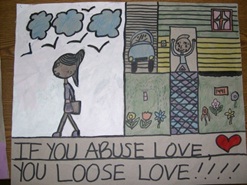Research In Action
Research In Action
Breadcrumb

The reality and impact of the interpersonal violence (IPV) is best described by those who experience it, such as Linda, age 45 and mother of two children:
“No one understands the financial impact being a victim of abuse has on you. They don’t talk about it either because they don’t understand. No he didn’t hit me every day, but look at me now! He took it all because he knew I wouldn’t be able to go on alone. Throughout the course of a year I lost my home, my children were displaced from their safe haven and uprooted from their friends. We were forced to into a nasty shelter, my ex is dragging me through court and now we have to live at my parents’ house. I never thought I would be here. I am certain all this stress has taken about 15 years off of my life. But I am so glad my kid’s doctor at Karabots asked me what was going on in my home. When they told me about the IPV specialist, I didn’t know what to expect. I’m so glad we connected. There’s no judgment.”
The American Academy of Pediatrics supports intervening on behalf of battered women as a way to prevent child abuse. Between 30% and 60% of abusive partners also abuse children in the household. With such disturbing numbers it makes perfect sense for families to be linked directly to resources, right? Children exposed to IPV display behavioral and developmental affects, such as low self-esteem; attention seeking; acting out/withdrawn; poor academic performance; substance abuse and poor social skills. Sadly enough, this is only a partial list. Linda’s daughter has since experienced bullying.
Since March of 2013, CHOP has partnered with Lutheran Settlement House’s (LSH) Children’s and Mom’s Project (CAMP) to have a full-time IPV Specialist on site at Karabots Primary Care Center. A recent addition to our team is a part-time specialist covering the Emergency Department and main hospital. Both positions have been instrumental in raising awareness of how IPV impacts children and also encouraging medical professionals to address any IPV issues. Providers and social workers feel that having onsite specialists is both “invaluable and advantageous.” The capability of screening for and then referring IPV-exposed children to an IPV Specialist guarantees all aspects of care are covered. The medical team can cater to the child’s needs while the IPV Specialist partners with the victimized parent to create a safety plan, access resources, consider options and referrals for counseling and or therapy.
For Linda and many other families at Karabots, screening has led to counseling and resources which allow them to feel empowered and validated. Linda did not present with bruises nor was she willingly ready to disclose her family trauma. She simply displayed signs of distress and shared concerns about her children’s behaviors. Programs like CAMP make it safe for families to share concerns and for providers to respond in a trauma-informed manner.

